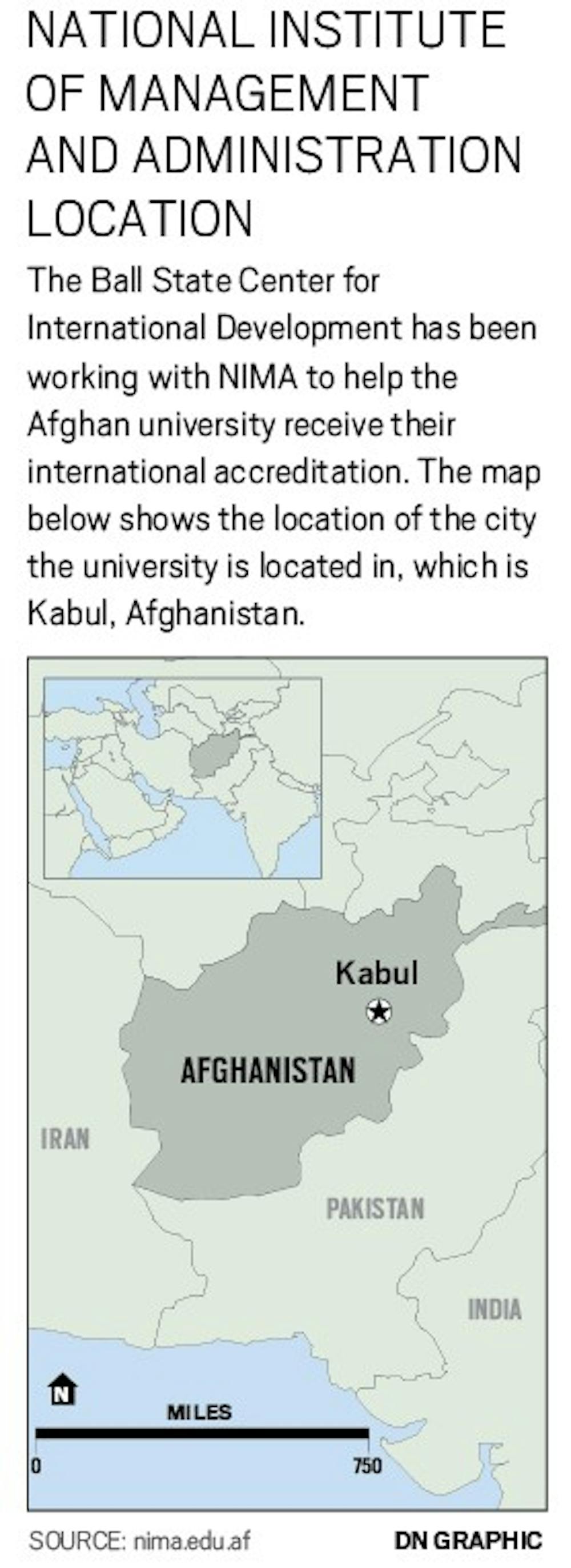NIMA facts:
• On average, 220 students out of the 2,000 who take the entrance exam pass
• This year, the exam was given to six different provinces
• The university is 26 percent women
• The university requires English proficiency
After 10 years of war, Afghanistan’s education system had been severely damaged, the project coordinator for the Center for International Development said.
Partly because of this, the Ball State Center for International Development has been working with The National Institute of Management and Administration (NIMA) in order to help the two-year Afghan university receive national accreditation. Ball State received a grant from the World Bank to work with NIMA.
Ball State is working with NIMA to develop their curriculums, hire qualified teachers, assist the teachers in updating their teaching methods and help the university recruit and admit students.
“We’re meeting with every single professor, looking at his or her syllabus and deciding whether the syllabus meets the standards for accreditation,” said Ken Holland, the executive director of the CID. “Most of them don’t, so we have to work really hard with the professors.”
Jan Miller, project coordinator for the Center for International Development, compared the university to a community college, a school that would prepare students to be work ready in accounting, management and information and communications technology (ICT) fields.
On average, only about 220 students pass the entrance exam of the 2,000 applying, said Huso Selimovic, project coordinator of the CID.
NIMA is the only institute in Afghanistan to require students to be proficient in English.
“Afghanistan is one of the poorest countries in the world, and it’s a very isolated country,” Holland said. “So in order to attract foreign investment, they need to have people who can speak English. English is the language of business, the language of the internet, so if a professional person knows English then he or she can get a job almost anywhere.”
Miller said since English is such a global language, it’s a viable way to bring work to Afghanistan.
“They’re hoping companies will come into Afghanistan,” she said, “and those companies speak English, so it helps [students] get jobs. They’re more highly valued in the marketplace and hopefully it’ll help build a workforce.”
Since 65 percent of Afghanistan’s population is under 24 years old, according to the Central Intelligence Agency, Miller said Afghanistan is putting an emphasis on developing an educated workforce.

There is also more emphasis on recruiting women to go to universities. Currently, NIMA members are 26 percent women, said Selimovic.
Jawed Samsor, director of academic affairs at NIMA, said the students coming to NIMA are motivated and choose NIMA over other institutes in Afghanistan.
“NIMA is in English and we have international faculties from different countries and the level of education is quite different than the other institutions in Afghanistan,” Samsor said.
He said when students graduate from NIMA, many find jobs in the private sector, working at banks, or with private companies in Afghanistan.
But he said many also go on to get their bachelors degree at private universities in Afghanistan.
Holland said there are a number of Ball State faculty who have traveled to Afghanistan to help out.
“For most of them it was their first opportunity to visit the country; for many it was their first opportunity to visit this part of the world,” Holland said. “So it’s very enlightening for them and it helps them develop as professionals. They get to know people and a culture that they would never otherwise be able to encounter.”
David Roof, an assistant professor of education, has traveled to Afghanistan four times over the past two years to help NIMA and has spent about two and a half months there. At first, he was part of the initial needs assessment, then moved on to working with curriculums.
“I was helping them with general curriculum things, helping faculty develop syllabi, organizing the management of classes, getting rid of outdated classes and things like that,” Roof said.
He worked with consultants through Ivy Tech Community College to help go over courses and content.
One of the things he noticed while he was there was how the classes were oriented around lectures.
“They’re very influenced by former British colonization, very top-down, lecture oriented,” Roof said. “Everything is lecture based – the teacher just up and talking, the students are very passive.”
But he said the students had a strong desire to learn.
“Their future is very uncertain and there aren’t the same kind of opportunities and safety nets there,” Roof said. “So their students are kind of clamoring for an education. They’re very motivated, wanting to learn.”

David Roof, an assistant professor of education, speaks to NIMA teachers. Roof originally went to Afghanistan to help NIMA with the initial needs assessment, but then after that was done, moved on to helping teachers fix their curriculum. PHOTO PROVIDED BY HUSO SELIMOVIC





